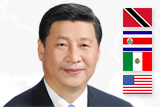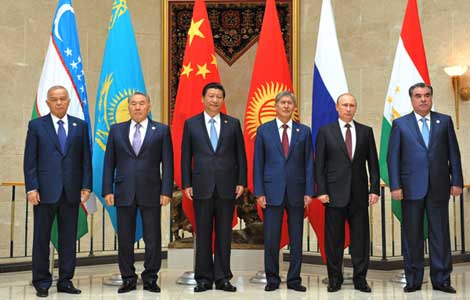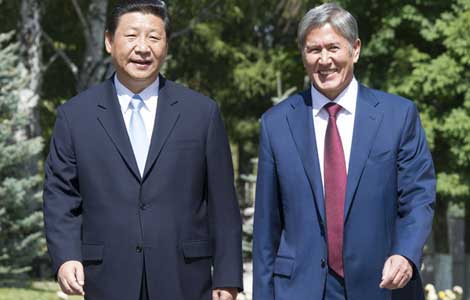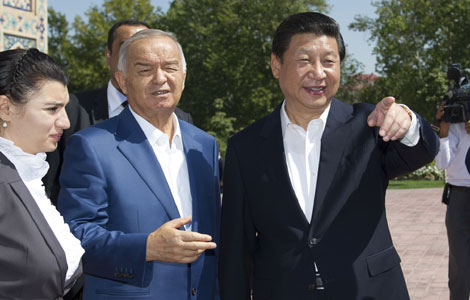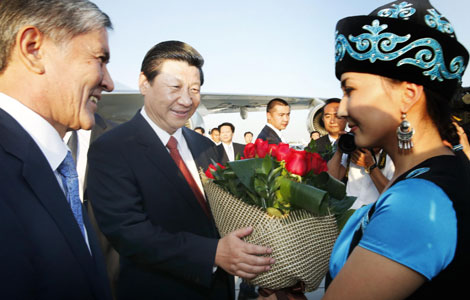China expects further co-op at G20 summit
Updated: 2013-09-06 13:43
(Xinhua)
|
|||||||||
OPENING UP AGAINST PROTECTIONISM
Over the past year, China has been frequently affected by protectionist moves in such fields as iron and steel, photovoltaic products and telecommunications.
Some countries still have an ingrained mindset to impose trade barriers and protectionism.
According to a report released earlier this week by the European Commission, about 150 new trade restrictions have been introduced by European Union (EU) countries in the past year, whereas only 18 existing measures have been dismantled. A total of almost 800 new measures have been identified since October 2008.
Global efforts to combat rising trade protectionism needed to be reinforced to help shield the fragile economic recovery, the report said.
In order to safeguard a free, open and non-discriminatory multilateral trade system and realize mutually beneficial development, Chinese leaders have urged all countries to oppose protectionism.
China's call is not only a response to its own concerns, but also a commitment to global competition and cooperation.
EU Trade Commissioner Karel De Gucht shares the same feelings on trade protectionism, an important point on the G20 summit's agenda.
"The G20 agreed a long time ago to avoid protectionist tendencies because we all know these only hurt the global recovery in the long run," De Gucht said.
IMPROVE ECONOMIC GOVERNANCE
Urging and pushing the International Monetary Fund's (IMF) quota reform was once an important achievement of the G20 summit.
"It should continue to increase the representation and voice of emerging markets and developing countries," Xi said in a recent written interview with media from Turkmenistan, Russia, Kazakhstan, Uzbekistan and Kyrgyzstan.
"In particular, it should speedily implement the quota and governance reform plans for the IMF, complete on time the IMF's quota formula adjustment and the next round of general quotas review by January 2014, and review the basket of currencies for special drawing rights as scheduled for 2015," Xi said.
The initial results of the IMF's reform have found developing countries' enhanced say not only brings new thinking for development, but also gives them a voice within the IMF.
In a report prepared for this summit, the IMF said emerging economies should introduce intervention measures when the market runs into disorderly fluctuations.
Besides the governance reform, advanced countries' domestic structural reforms also have been an agenda item of the G20 summit for years.
This round of disturbances in emerging markets was triggered by the looming taper of quantitative easing monetary policy of the Federal Reserve but deep structural problems in emerging markets were the root cause. Thus only reform can ultimately consolidate and enhance their sustainable growth.
Among the emerging markets, China undoubtedly leads in structural adjustments.
In addition to the need for emerging markets to vigorously push reform, developed countries' sovereign debt and financial sustainability are also a key global economic risk. This is also a crucial priority of reform for the G20.
Also, G20's operating mechanism needs to be adjusted.
Xi has noted: "Right now, the G20 is in a transition from a crisis-management mechanism to one that is dedicated to long-term economic governance."
Related Stories
World leaders pressure Obama over Syria at G20 summit 2013-09-06 10:21
Xi calls for closer G20 ties to boost world economy 2013-09-06 04:54
Xi aims to defend China's economic stability at G20 2013-09-05 21:34
BRICS countries confer at G20 summit 2013-09-05 20:11
Tokyo's lack of sincerity means no China-Japan summit at G20 2013-09-05 17:27
Chinese Vice-Finance Minister meets press at G20 2013-09-05 16:58
China's G20 role 2013-09-05 10:45
Schedule




